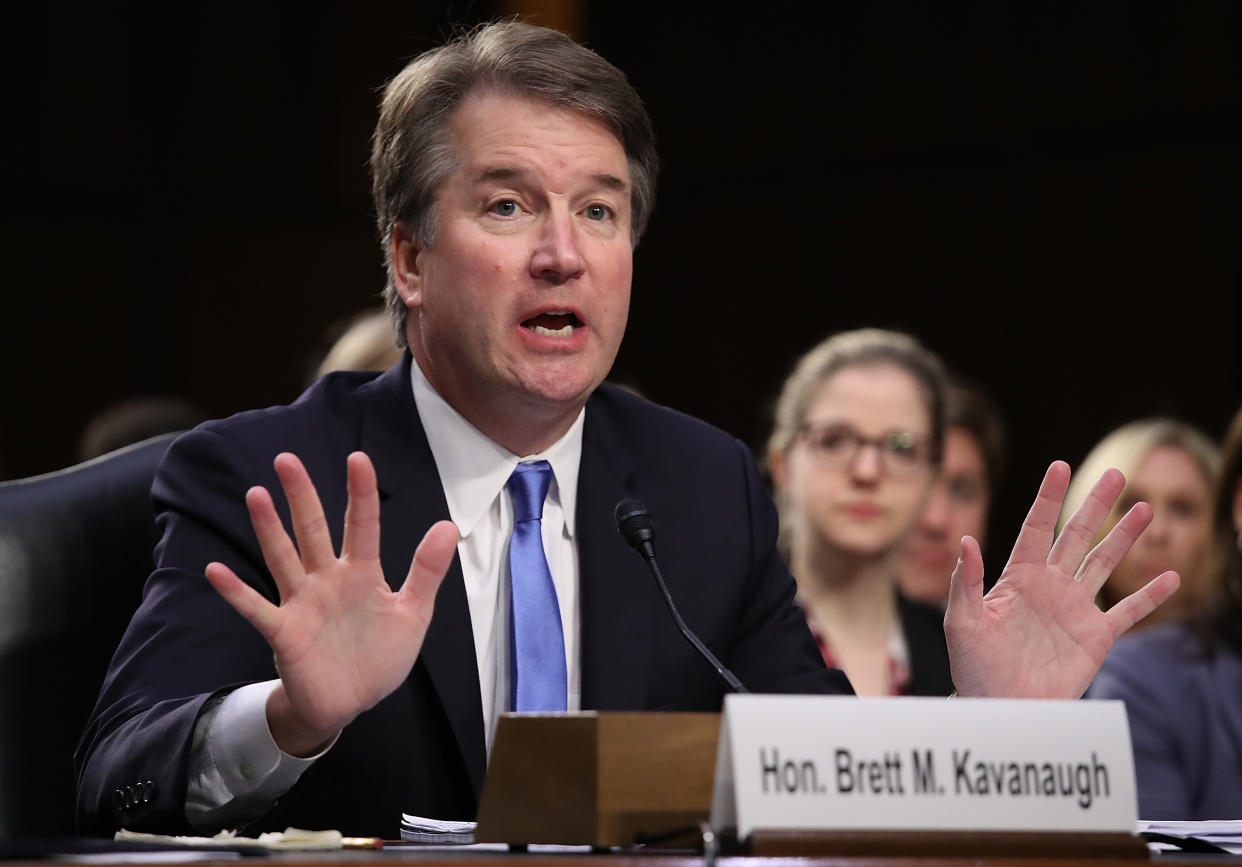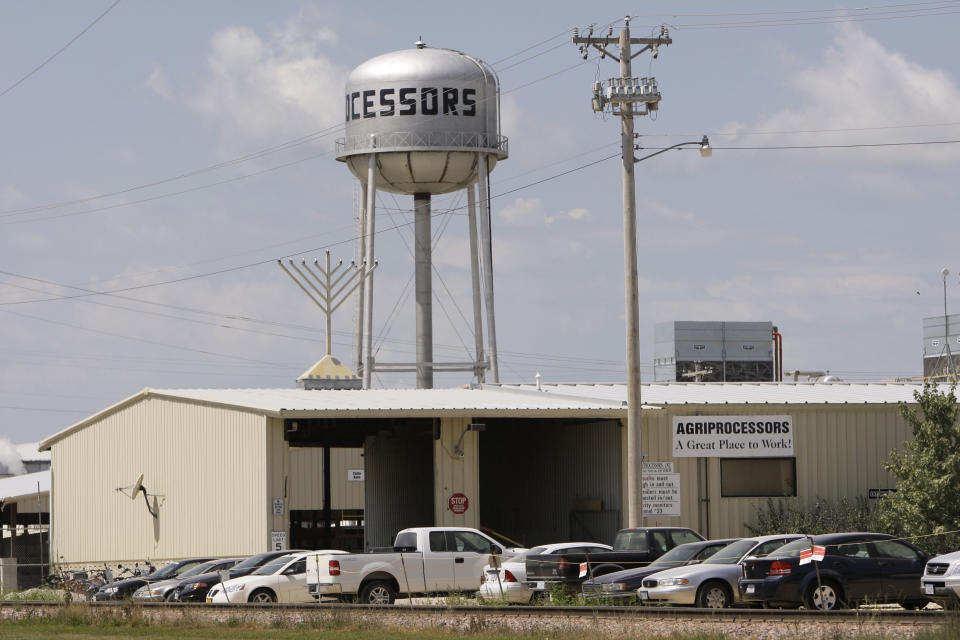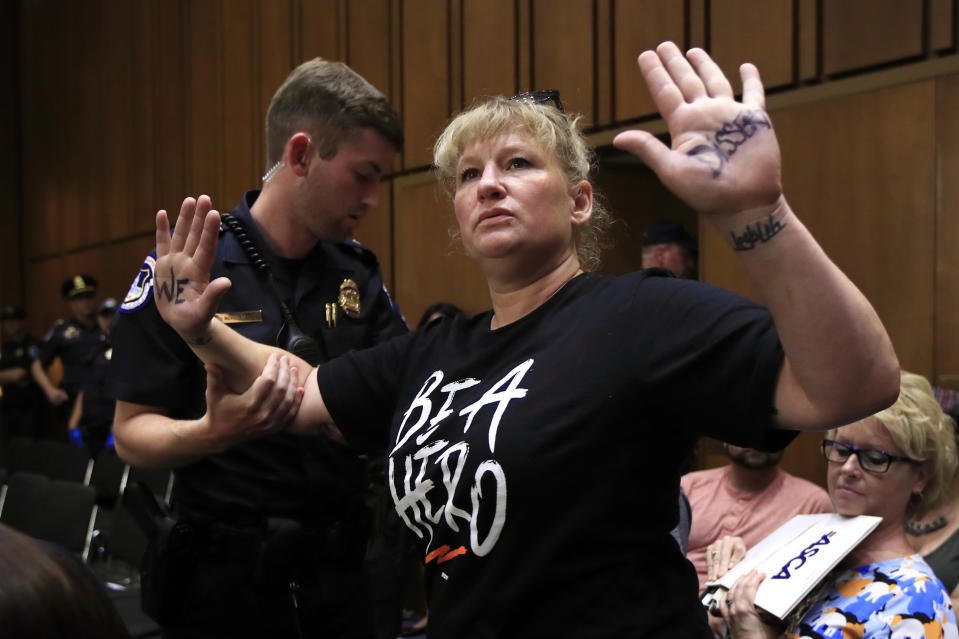Immigration rulings raise questions about Kavanaugh's commitment to precedent

If there was a theme to Supreme Court nominee Brett Kavanaugh’s second day of confirmation hearings, it would be “precedent.”
President Trump’s controversial pick for the seat previously held by longtime Justice Anthony Kennedy used the word repeatedly as he fielded questions from both Republican and Democratic members of the Senate Judiciary Committee. Kavanaugh made the point that notwithstanding his previously expressed critiques of several key precedential rulings, his opinions as a judge are informed not by his personal views but by the legal principles established by the Supreme Court.
Throughout these hearings, Democrats have been seeking to put Kavanaugh on the record about how he would vote on cases that might turn on Supreme Court precedents with which he’s publicly — and controversially — disagreed, notably Roe v. Wade. Though he said on Wednesday that the landmark 1973 ruling that legalized abortion was “important precedent,” some Democrats are wary of what they suspect is his willingness to disregard past opinions.

For example, Democratic Sen. Dianne Feinstein called out Kavanaugh’s dissent, as a member of the D.C. Circuit, in a case last year regarding whether a 17-year-old undocumented immigrant in federal custody should be allowed to obtain an abortion.
“You argue that even though the young woman had complied with Texas parental notification law and secured an approval from a judge, she should nonetheless be barred,” said Feinstein, telling Kavanaugh that, in his dissent in the case known as Garza v. Hargan, “you ignored, and I believe mischaracterized, a Supreme Court precedent.”
Feinstein took issue with Kavanaugh’s opinion, which would have required the young woman to wait for a government-approved “sponsor” to provide a “support network of friends and family,” running the risk, she said, that the process would extend past her 20th week of pregnancy, the legal limit in Texas, where she was being held. Feinstein asserted that Kavanaugh’s dissent amounted to rewriting a Supreme Court precedent that established the judicial bypass process for pregnant minors in need of an abortion who cannot obtain parental consent, “requiring courts to determine whether a young woman had a sufficient support network when making her decision.”
“This reason, I believe, demonstrates that you are willing to disregard precedent,” Feinstein said.
Though abortion is considered the central issue at play in the Garza case, it’s also just one example of a case involving immigrants in which Kavanaugh’s commitment to precedent and existing statutes has come under scrutiny.

During a particularly pointed series of questions Wednesday afternoon, Democratic Sen. Dick Durbin highlighted Kavanaugh’s 2008 dissent in a case concerning the rights of undocumented immigrant workers at a slaughterhouse to unionize.
“The fact that you were a dissenter and everyone else saw it the other way should give us pause when you say you only follow precedent,” said Durbin.
The majority of Kavanaugh’s colleagues on the D.C. Circuit Court of Appeals ruled in favor of the undocumented workers in this case, Agri Processor Co. Inc. v. National Labor Relations Board, citing both the “plain language” of the 1935 National Labor Relations Act, which guarantees the basic rights of private sector employees to join unions and demand better wages and working conditions through collective bargaining, as well as the 1984 Supreme Court ruling in a case known as Sure-Tan Inc. v. NLRB, explicitly affirming that, “since undocumented aliens are not among the few groups of workers expressly exempted by Congress” under the National Labor Relations Act, “they plainly come within the broad statutory definition of ‘employee.’”
Congress did not make it illegal for companies to knowingly employ undocumented immigrants until two years after the Sure-Tan decision, with the passage of the Immigration Reform and Control Act (IRCA) in 1986. In Agri Processor, the majority noted in its opinion that, “not only is there no clear indication that Congress intended IRCA implicitly to amend the NLRA, but all available evidence actually points in the opposite direction.”
Despite his purported reverence for Supreme Court precedent, and his self-described “textualist” approach to interpreting legislation strictly by adhering to the plain text of a statute, Kavanaugh dissented sharply in Agri Processor. He went beyond the company’s claim that its undocumented workers could not unionize because they did not qualify as “employees” under the National Labor Relations Act, relying on a previously uncited passage of the Sure-Tan decision to make the point that it was actually the majority opinion that was inconsistent with Supreme Court precedent.

After outlining the core reasoning for its determination that undocumented workers do qualify as “employees” under the NLRA, the court went on to offer a supplementary explanation in Sure-Tan for why there appeared to be no conflict between this finding and then-existing immigration law, which at that time, 1984, did not prohibit businesses from hiring undocumented workers. Kavanaugh hinged his dissent in Agri Processor on this secondary section, which wasn’t even cited in the majority opinion. He argued that it set a precedent for interpreting the definition of “employee” under the NLRA “in conjunction with the immigration laws.” According to that reasoning, he wrote, “I would hold that an illegal immigrant worker is not an ‘employee’ under the NLRA for the simple reason that, ever since [the passage of the IRCA in 1986, an illegal immigrant worker is not a lawful ‘employee’ in the United States.”
In their response to Kavanaugh, his colleagues in the majority found that he had essentially sought to create a new rule, by inferring that the NLRA had been implicitly amended by the IRCA, based not on any guidance from Congress but an interpretation of part of a Supreme Court decision written two years prior to the IRCA’s passage. The rule, they warned, “would lead to the absurd result that the Supreme Court — or any court for that matter — could alter the plain meaning of future legislation simply by announcing what current legislation does not mean.”
Durbin cited this warning from Kavanaugh’s fellow judges during Wednesday’s hearing, questioning how the judge could reconcile his opinion in this particular case given that “you claim over and over again to be a textualist to be carefully weighing every word of a statute.”
“You bent over backwards to take the company’s side against these workers,” Durbin said, as Kavanaugh repeated his refrains that “it’s all about precedent” and “I have no agenda in any direction… I’m a judge.”
“’I’m just a judge, I just follow precedent,’” Durbin interjected. “We’ve heard that so often, and I hope it’s the case.” In this case, he told Kavanaugh, “you failed to follow Supreme Court precedent.”
Durbin’s questions about the Agri Processor dissent echoed concerns expressed by some immigration attorneys who’ve been closely mining Kavanaugh’s past opinions for signs of how he might approach the various immigration-related cases that are likely to come before the Supreme Court in the coming session. Lawsuits concerning such issues as the government’s ability to indefinitely detain immigrants without bond hearings, the role of local officials in federal immigration enforcement and the future of the Deferred Action for Childhood Arrivals program, or DACA, are already making their way toward the high court, while experts foresee potential challenges to things like the 1982 Supreme Court decision that guaranteed the right to public K-12 education for all children in the United States, regardless of immigration status, or the 1898 decision that affirmed that anyone born in the U.S. is automatically a citizen under the 14th Amendment.

The D.C. Circuit Court of Appeals, where Kavanaugh has served as a judge since 2006, is not exactly a magnet for immigration cases, making his record on the issue relatively limited. Still, attorneys and advocates on both sides of the immigration debate have pinpointed a handful of specific opinions, including Agri Processor, which they suggest offer important insight into how he might approach such cases if confirmed to the Supreme Court. Kavanaugh’s view that undocumented workers do not qualify as “employees,” and therefore don’t have basic rights, is obviously a red flag for immigration advocates at a time when workplace immigration raids are becoming common.
For immigration hard-liners and restrictionists, Kavanaugh’s opinion on undocumented workers is seen as a sign that Trump’s Supreme Court nominee is on their side. In July, Breitbart News deemed Kavanaugh to be the “America First” Supreme Court pick, pointing to the judge’s opinions in the Agri Processor case among others, as evidence that “Kavanaugh applies Trump’s economic patriotism to the law.” Days later, Jesse Merriam echoed Breitbart’s view in an op-ed for Real Clear Politics, writing that “The best publicly available data indicate that, of all the judges under consideration, Judge Brett Kavanaugh is most likely to advance President Trump’s America First constitutional vision.”
Dan Stein, president of the Federation for American Immigration Reform (FAIR), an influential Washington-based nonprofit that advocates for reducing all types of immigration to the U.S., called Kavanaugh a “superb choice” for the Supreme Court.
“President Trump should be commended for choosing a candidate who clearly understands the nation’s patchwork of immigration laws and how they are intended to protect both American workers and the overarching national interest,” Stein said in a press release. Dale Wilcox, executive director and general counsel at the Immigration Reform Law Institute, or IRLI, FAIR’s legal arm, echoed similar sentiments in an interview with NRA-TV.
It likely won’t receive much, if any, airtime during this week’s confirmation hearings, but Kavanaugh’s 2014 dissent in a case concerning the ability of a Brazilian steakhouse chain to obtain temporary work visas for Brazilian gaucho chefs at its restaurants in the U.S. has also drawn attention from immigration advocates and opponents alike.

The meat of the case is this: Originally founded in the Rio Grande do Sul region of Southern Brazil in 1979, Fogo de Chao first introduced its chain of churrascarias, traditional Brazilian barbecue steakhouses, to the United States in 1997. Between then and 2006, the federal government granted the company more than 200 temporary work visas, known as L-1B’s, for its Brazilian gaucho chefs, or churrasqueiros, who grew up in Rio Grande do Sul and have been trained to both cook and entertain in the region’s unique barbecue tradition. Since 1970, L-1B visas have allowed qualifying multinational businesses to bring foreign employees with “specialized knowledge” to work temporarily in the United States, and Fogo de Chao attributes much of its success to the employment of authentic gaucho chefs in each of its restaurants.
However, in 2010, the Department of Homeland Security’s Administrative Appeals Office denied Fogo de Chao’s request to transfer another churrasqueiro chef to the U.S. on an L-1B visa, concluding that the chef’s cultural background, training and extensive experience in cooking and serving food in the churrasco tradition did not constitute a “special knowledge” of his employer’s product.
Fogo de Chao sued, and the majority of judges on the D.C. Circuit Court found that DHS’s decision to categorically dismiss culturally acquired skills in its denial of the Fogo de Chao chef’s visa application was “legally erroneous” and “devoid of any reasoned explanation as to why training and skills-acquisition can qualify as specialized if obtained from a corporate instructor, but categorically cannot just because they are learned from family or community members.” The court ordered that the earlier decision be vacated and remanded back to the Appeals Office for further review, clarifying that the office could not simply impose a new bar on culturally acquired skills without some sort of regulatory guidance, statute or reasoned analysis to back it up.
Once again, Kavanaugh was the lone dissenter, authoring an opinion that elicited “puzzlement” from his fellow judges on the bench. While the court records pretty clearly demonstrate that the agency’s bar on culturally acquired skills had emerged as part of its decision to deny Fogo de Chao’s request for an L-1B visa, Kavanaugh declared that he “fully agree[s] with “the agency’s longstanding position” that “one’s country of origin, or cultural background, does not constitute specialized knowledge.”
He went onto disregard a number of other key details outlined in the case, including the 200-plus L-1B visas previously granted to Fogo de Chao’s churrasqueiros, and the fact that the company largely employs American chefs at its restaurants, relying on the Brazilian churrasqueiros to train them. Discarding Fogo de Chao’s rather complicated claim about the nuances of its business model and the crucial role authentic churrasqueiros play in the company’s profitability, Kavanaugh instead interpreted the company’s argument to be simply that “American chefs either can’t learn to cook or won’t cook Brazilian steaks.” He went on to accuse the company of simply seeking to “import experienced Brazilian chefs rather than hiring and training only American chefs” in an effort to save money, arguing that this case is, at least in part, “Fogo’s desire to cut labor costs masquerading as specialized knowledge.” Then, citing an unspecified “provision of the immigration laws,” he concluded that “mere economic expediency does not authorize an employer to displace American workers for foreign workers.”

“It’s really remarkable,” Tom Jawetz, vice president of immigration policy at American Progress, said of Kavanaugh’s dissent in the Fogo de Chao case.
“There’s no reference to statute, there’s no reference to regulation and there’s no reference even to the memoranda that for decades have guided the government’s decision making around the L-1B visas that were at issue there,” said Jawetz, who previously served as chief counsel on the Immigration Subcommittee of the House Judiciary Committee. “Instead he kind of makes this MAGA cultural argument.” (Indeed, Breitbart, FAIR and others have praised Kavanaugh’s take on Fogo de Chao as more proof of his alignment with the “America First” agenda.)
“To reject the concept that knowledge is acquired through your cultural upbringing and life experiences … is to reject the very concept of diversity as our strength, the very notion that we can stand to learn from people who are different than us and had a different life experience than us,” said Jawetz. “That, to me, is a reflection of a closed mind that I fear more than anything else will infect his ability to make fair and honest judgments about cases addressing immigrants and communities of color more broadly going forward.”
Like the Agri Processor case, however, Kavenaugh’s rationale in his Fogo dissent raises concerns about more than his attitude toward immigrants.

Diane Butler, a Seattle-based immigration attorney and board member of the American Immigration Lawyers Association, said she couldn’t help but recall the Fogo de Chao dissent when she heard Kavanaugh state firmly during his confirmation hearing this week that he would uphold the law as written.
“In that case it seemed to me that he tried to rewrite the law,” said Butler. Not only was Kavanaugh’s claim of a longstanding cultural knowledge bar unsubstantiated — “He was essentially making that up” — but, she said, “he fabricated his argument that the restaurant was using these workers to displace Americans. That evidence did not exist. In fact, he ignored the evidence that the restaurant predominantly hired American chefs and brought” Brazilians over to train them.
“His focus was almost entirely on nonexistent evidence that the employer just wanted to hire cheap foreign labor in their U.S. restaurants,” she said.
Butler predicts that, based on Kavanaugh’s dissent in that case, if confirmed to the Supreme Court he might be inclined to go beyond the current immigration laws and statutes to enforce Trump’s “Buy American, Hire American” executive order.
“That is concerning, because it leads to a high level of unpredictability in business immigration,” she said.
“The way he tried to sideswipe the law is concerning not only in immigration but other fields as well,” she continued. “We don’t want judges trying to rewrite the law, we want them to do what he said he would do, which is apply the law as written.”
Read more from Yahoo News:
Omarosa says she’s ready to testify at Trump’s impeachment trial
House Intel Dem: Trump collusion with Russia ‘is well established’
Un-Borkable: Kavanaugh heads into confirmation hearings on cruise control
Former presidents pay homage as McCain takes his place in history
Cory Booker is on the campaign trail, but not in the way you might think



